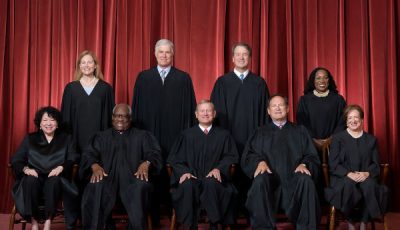Mile High Objects to Plaintiff’s “Salem Witch Trial Tactics”
 BOSTON – In his latest filing on behalf of Mile High Distribution and the other defendants in a lawsuit filed last year by Massachusetts-based artist Leah Bassett, attorney Gary Jay Kaufman takes strong issue with the tactics of the plaintiff and her counsel, accusing them of employing “Salem Witch Trial tactics” in pursuing their claims.
BOSTON – In his latest filing on behalf of Mile High Distribution and the other defendants in a lawsuit filed last year by Massachusetts-based artist Leah Bassett, attorney Gary Jay Kaufman takes strong issue with the tactics of the plaintiff and her counsel, accusing them of employing “Salem Witch Trial tactics” in pursuing their claims.
“This motion is about two discovery requests. Nothing more, nothing less,” Kaufman wrote in opposition to a motion to compel answers filed last month by Bassett. “But as has become routine practice now, seemingly innocuous motions are filed on behalf of the Plaintiff which are riddled with wild accusations, red herrings, and old issues. All of this is meant to distract from the point, provoke responses from the defendants on stale and unrelated topics, and inflame the Court.”
In the filing, Kaufman further asserted that none of the information the plaintiff seeks in her motion to compel “is relevant to any issue in this case.”
“(I)nstead of explaining why she is entitled to the information sought in the two discovery requests at issue, Plaintiff spends pages discussing unrelated (and unfounded) grievances, including complaints about other discovery requests that have already been addressed and ruled on,” Kaufman wrote. “She doesn’t address why she is entitled to it, because she can’t. Rather, she reverts to Salem Witch Trial tactics – for example, demanding that Mile High produce its tax returns to prove that it’s not a tax evader (just because she ‘suspects’ it), even though she hasn’t an iota of evidence to support the theory and even though it has no relationship to this case whatsoever.”
In the plaintiff’s motion to compel answers filed in late September, the plaintiff noted that in a previous document request submitted in the case, the plaintiff had requested that the Mile High defendants “produce a copy of all tax returns filed by Mile High Distr., and any separately-incorporated subsidiaries, for the years 2014-to-present in all federal, state, provincial, or other geographical jurisdictions in which Mile High Distr., directly or indirectly, markets its adult entertainment products.”
The defendants declined to provide the requested tax records, objecting that the request “seeks private financial and tax information that has no bearing on the allegations in this case and the claims asserted by Plaintiff.”
In the motion to compel, Bassett’s counsel contended that the “singular fact that Ms. Jensen has claimed in her Discovery Responses that she has no tax records whatsoever within her possession or control, either in her individual name or in Toaster Kidd, Inc.’s name, as to the multi-year porn-creation activities that she was performing as the Mile High Defendant’s retained Producer, Writer and Producer… lends support to Ms. Bassett’s long-standing suspicion that Ms. Jensen, individually and in conjunction with her Mile High partner(s)/employer, was engaged in a massive tax evasion/fraud.”
In his opposition to the motion to compel, Kaufman wrote that “Instead of going through each and every irrelevant and unfounded allegation/accusation stated in the Motion that does not relate to the discovery requests, Mile High will limit its analysis to the requests and the objections only, and why Plaintiff is not entitled to anything further.”
With respect to the interrogatory asking the defendants to “describe all business entities, incorporated or otherwise, that fall within the scope of ‘Mile High Media’, including the name; location; managerial officers; owners/shareholders; and, the business purpose and/or activities for each such entity,” Kaufman stated the defendants object “on a number of grounds.”
“Chief among them is (1) the interrogatory is vastly overbroad insofar as the scope of parties it could extend to (and as such would also inappropriately exceed the number of interrogatories Plaintiff is allowed to propound under the Local Rules),” Kaufman wrote, “and (2) the interrogatory seeks information relating to non-parties that is both personal and entirely irrelevant to this case.”
Kaufman also argued that while the interrogatory is both too broad and “unclear as to whose information exactly is being sought,” other aspects of the interrogatory are clear.
“(O)ne thing is certain,” Kaufman wrote, “Plaintiff is trying to get information about non-parties to this action, including information that is personal and financially sensitive. No matter the scope, these requests are directed to Mile High. Mile High cannot respond on behalf of other entities as to this information – including in particular who their managerial officers are, who their owners and shareholders are, what their business purpose is, or what their activities are.”
Kaufman added that Mile High “can respond on its own behalf, about its own information. And that is precisely what it did. Mile High provided the information sought for the only relevant party to this litigation, the defendant in this case. And it provided it for the only entity it can provide it for – itself.”
As for the tax documents sought by the plaintiff, Kaufman asserted that “Mile High’s tax returns do not prove or disprove a single fact in this case.”
Noting that the plaintiff’s complaint includes a civil RICO claim, which has been amended to assert the defendants’ predicate act is one of “criminal copyright infringement,” Kaufman argued that even if the plaintiff’s assertions are true, the tax documents she seeks are irrelevant to it.
“Even assuming all that is true, what does that have to do with Mile High’s tax returns and tax reporting obligations?,” Kaufman wrote. “Even if her suspicions are correct, and Mile High is a rampant tax evader, how does that affect her RICO claim or unfair business practices claim? Was Plaintiff proximately harmed by that?”
“This information has nothing to do with her claims or injuries,” Kaufman added, “and therefore is not a proper subject of discovery.”
The case is ongoing; YNOT will continue to track and report on future developments.













